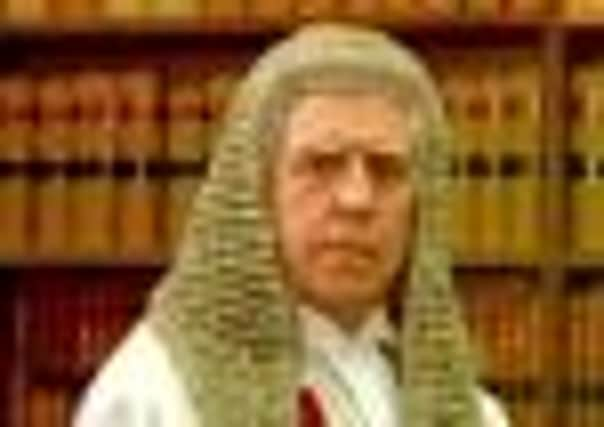Press regulation: McCluskey defends new law plan


Lord McCluskey confirmed his proposal that Scotland’s press should be subjected to law – a move that could see journalists prosecuted for breaking the industry’s code of practice.
Writing in The Scotsman today, he says his proposals would make it “effectively unlawful” to breach the Editors’ Code of Practice – which sets the benchmark for press standards and behaviour.
Advertisement
Hide AdAdvertisement
Hide AdLord McCluskey, who led the inquiry into media standards in Scotland, also revealed First Minister Alex Salmond had twice intervened to ask for the report’s publication to be delayed until cross-party talks on press regulation south of the Border had concluded.
Mr Salmond has already distanced himself from the proposal to impose a compulsory regime of press regulation underpinned by law, which he said was “not the view of the government or government ministers”.
The expert group chaired by Lord McCluskey was set up by the Scottish Government in the wake of the Leveson Inquiry, which heard from victims of phone-hacking and press intrusion.
But the proposed Scottish regime goes further than the measures set out by Lord Leveson, who did not propose a mandatory system, and came in for sharp criticism when it was published last week.
The McCluskey report said a voluntary system, with publishers signing up to a new regulatory system as laid down by Leveson, would not work.
Lord McCluskey, a former solicitor-general for Scotland, said a specific law applying to journalists was needed, in the same way road traffic acts of parliament affect “those who drive motor vehicles on public roads”.
He said the only effective way to enforce the industry’s code of practice was to subject it to a “normal legislative method”, such as the law on contempt of court.
In his Scotsman article, he writes about the need to “identify the behaviour that is to be curbed in the media” and to “make it unlawful” for those practices to take place.
Advertisement
Hide AdAdvertisement
Hide AdHe also insists misinformation surrounding his report needs to be cleared up.
However, a Scottish media expert warned that prosecuting journalists for breaking the code of practice would be “open to abuse” by governments.
Dr Michael Higgins, subject leader for journalism at the University of Strathclyde, suggested the move could prevent investigations such as that led to the exposure of the Westminster expenses scandal.
He said: “Newspapers could end up at an even greater disadvantage here as it would be having a law that applies to journalists that doesn’t apply to everyone else.
“That would be a deeply worrying approach and could be open to abuse in the longer term, as we have no way of knowing whether future governments might have a less benign approach to press regulation.
“I’d also be wary about the effect a specific law like this might have on freedom of speech, as we also don’t know what laws and judges will be in place in 20 or 25 years.
“If the journalism that led up to the expenses scandal was not possible, for example, then society would be poorer for this.”
Tory MSP Alex Johnstone said he was “extremely wary” of the proposed reforms, which he suggested would erode press freedom.
Advertisement
Hide AdAdvertisement
Hide Ad“It could obviously be open to abuse,” he said. “We’re moving into a critical period of Scotland’s history and we need to resist anything that would allow the establishment of a process that could impose restrictions on freedom of speech.”
Meanwhile, Lord McCluskey explained how he had rejected two requests from Mr Salmond to postpone the publication of the report until the outcome of talks at Westminster on Leveson.
He said there had been an initial approach from the First Minister “through officials”, which was refused because the report had been completed.
Lord McCluskey said Mr Salmond then “telephoned me personally” asking for a delay, which he also rejected.
A Scottish Government spokeswoman said the First Minister had approached Lord McCluskey about delaying his report to see if the Westminster debate would inform the discussions on press regulation in Scotland.
The spokeswoman said: “The First Minister telephoned Lord McCluskey on Wednesday, 13 March, 2013 to suggest that there might be merit in delaying completion of the report so account could be taken of any agreement that might emerge at Westminster, as happened on Monday, 18 March.”